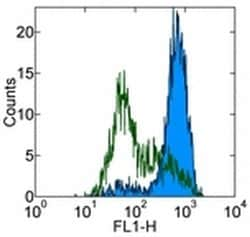Learn More
CD209 (DC-SIGN) Monoclonal Antibody (eB-h209), eBioscience™, Invitrogen™


Rat Monoclonal Antibody
$370.00 - $1592.00
Specifications
| Antigen | CD209 (DC-SIGN) |
|---|---|
| Clone | eB-h209 |
| Concentration | 0.5 mg/mL |
| Applications | Flow Cytometry, Immunoprecipitation |
| Classification | Monoclonal |
| Catalog Number | Mfr. No. | Quantity | Price | Quantity & Availability | |||||
|---|---|---|---|---|---|---|---|---|---|
| Catalog Number | Mfr. No. | Quantity | Price | Quantity & Availability | |||||
14-209-982
 
|
Invitrogen™
14209982 |
100 μg |
Each for $370.00
|
|
|||||
14-209-937

|
Invitrogen™
14209937 |
2 mg |
Each for $1,592.00
|
|
|||||
Description
Description: The eB-h209 monoclonal antibody reacts with human CD209, also known as DC-SIGN, a 44 kDa type II transmembrane protein. DC-SIGN contains a C-type lectin binding domain and binds ICAM-3, ICAM-2, and HIV virus. Human dendritic cells preferentially express DC-SIGN. It has been postulated that DC-SIGN serves as a receptor for capture, trafficking, and transmission of HIV to T cells and supports primary immune response. eB-h209 was developed against a C-terminal peptide of human DC-SIGN. Applications Reported: The eB-h209 antibody has been reported for use in flow cytometric analysis, and immunoprecipitation. Applications Tested: The eB-h209 antibody has been tested by flow cytometric analysis of cultured human dendritic cells and peripheral blood cells. This can be used at less than or equal to 1 μg per test. A test is defined as the amount (μg) of antibody that will stain a cell sample in a final volume of 100 μL. Cell number should be determined empirically but can range from 10^5 to 10^8 cells/test. It is recommended that the antibody be carefully titrated for optimal performance in the assay of interest. Purity: Greater than 90%, as determined by SDS-PAGE. Aggregation: Less than 10%, as determined by HPLC. Filtration: 0.2 μm post-manufacturing filtered.
This gene encodes a transmembrane receptor and is often referred to as DC-SIGN because of its expression on the surface of dendritic cells and macrophages. The encoded protein is involved in the innate immune system and recognizes numerous evolutionarily divergent pathogens ranging from parasites to viruses with a large impact on public health. The protein is organized into three distinct domains: an N-terminal transmembrane domain, a tandem-repeat neck domain and C-type lectin carbohydrate recognition domain. The extracellular region consisting of the C-type lectin and neck domains has a dual function as a pathogen recognition receptor and a cell adhesion receptor by binding carbohydrate ligands on the surface of microbes and endogenous cells. The neck region is important for homo-oligomerization which allows the receptor to bind multivalent ligands with high avidity. Variations in the number of 23 amino acid repeats in the neck domain of this protein are rare but have a significant impact on ligand binding ability. This gene is closely related in terms of both sequence and function to a neighboring gene (GeneID 10332; often referred to as L-SIGN). DC-SIGN and L-SIGN differ in their ligand-binding properties and distribution. Alternative splicing results in multiple variants.Specifications
| CD209 (DC-SIGN) | |
| 0.5 mg/mL | |
| Monoclonal | |
| Liquid | |
| RUO | |
| PBS with 0.09% sodium azide; pH 7.2 | |
| 30835 | |
| Primary | |
| 4°C | |
| CD209 |
| eB-h209 | |
| Flow Cytometry, Immunoprecipitation | |
| Unconjugated | |
| Rat | |
| Human | |
| Q9NNX6 | |
| IgG2a κ | |
| Affinity chromatography | |
| Antibody |
The Fisher Scientific Encompass Program offers items which are not part of our distribution portfolio. These products typically do not have pictures or detailed descriptions. However, we are committed to improving your shopping experience. Please use the form below to provide feedback related to the content on this product.
